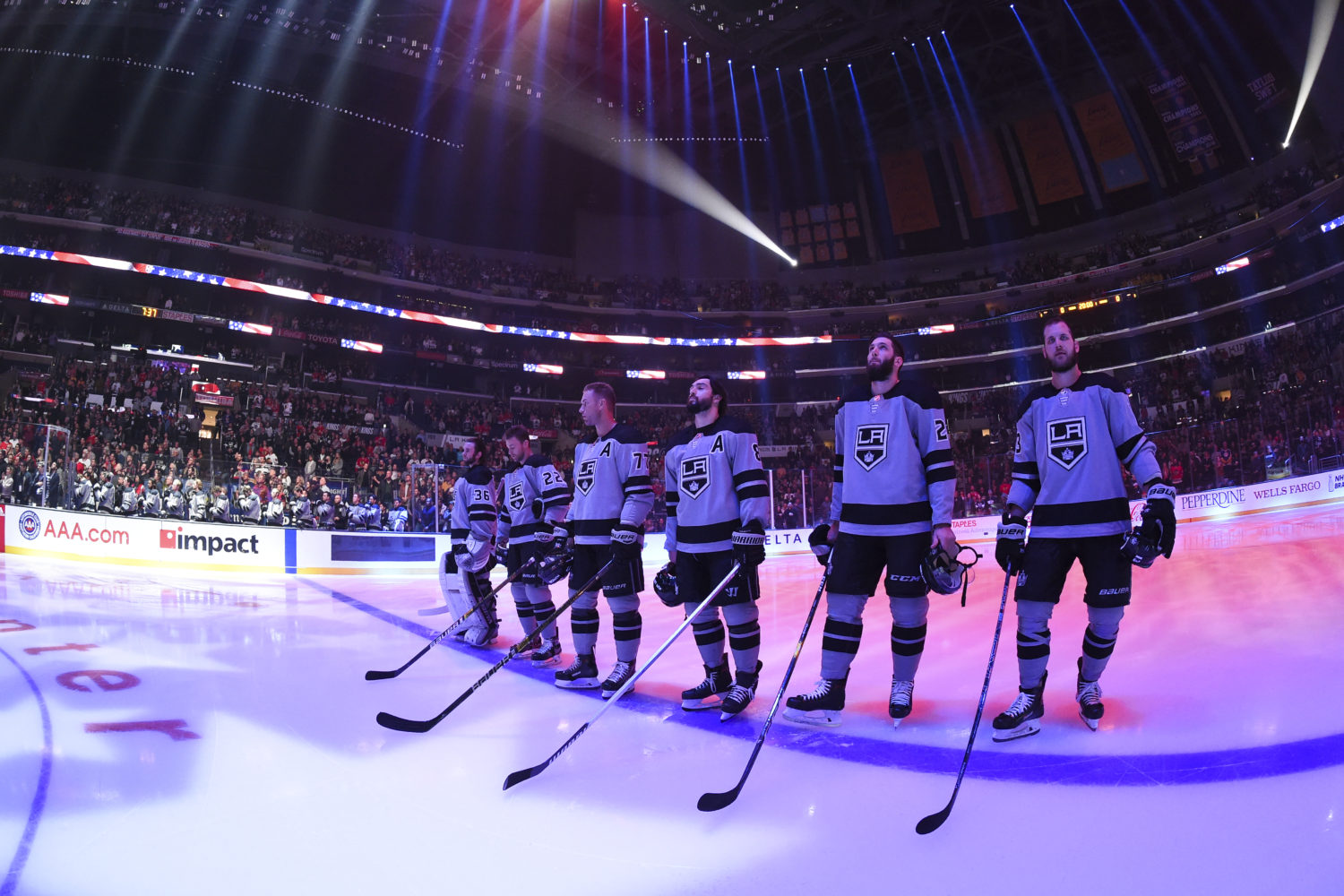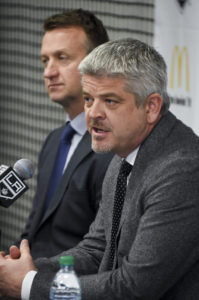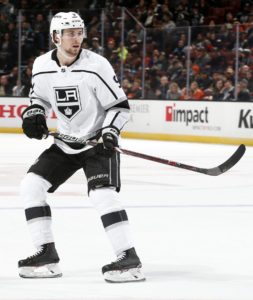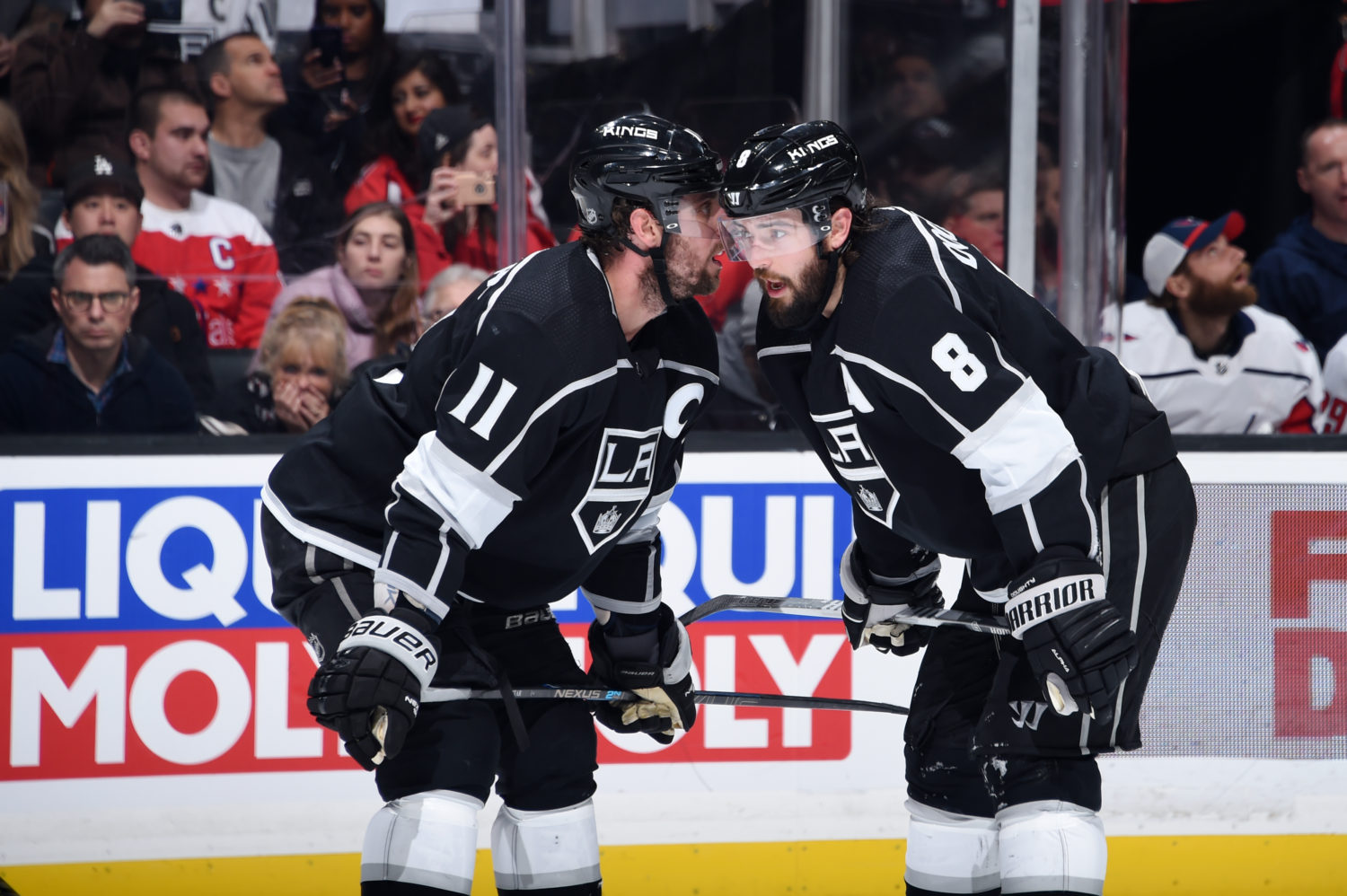As the 2018-19 season wound down, and the LA Kings’ most pressing postseason question was where they’d land in the draft lottery, Team President Luc Robitaille and Chief Operating Officer Kelly Cheeseman made a number of rounds to groups of season ticket members, sponsors, partners, rightsholders, broadcasters and members of the media to communicate what the team’s approach would be in both the immediate and longer-term aftermath of a very disappointing season.
Among the points they articulated was the error in judging that the veterans would be able to “hold the fort” in order to buy time while incorporating a younger generation of players onto the roster.
That didn’t happen. The Kings finished in 30th place, and Rob Blake, heading into his third year as General Manager, ventures into a 2019-20 season guiding an organization with a vastly recalibrated set of expectations.
Blake acknowledges he’s learned a lot from his first two seasons. He laughs genially but self-deprecatingly as he says so, wildly aware that the team fell miles short of expectations. One can imagine how frustrating of a nine months it has been, and he’s aware of the challenges that aren’t immediately or easily rectifiable. He wasn’t Julian Brisebois inheriting the Tampa Bay Lightning. He inherited a Kings team that spent to the cap but was receiving diminishing returns from very good but aging and expensive players, and though the team rode a hot start to a playoff berth in his first season, after two years there’s a 76-71-17 record alongside his name, no more playoff wins than when he started and a clear internal focus towards navigating the team back to contention.
“You learn what to do and what not to do,” Blake said. “You’ve got to have a little patience and you’ve got to have a direction that we want to go to. We changed the direction. We knew it was going to come to this point eventually, it came a little quicker than we would’ve liked it to, that’s all that happened. We were able to adjust there last year and now we’ve got to see through it. So that’s why I say that these internal changes are going to make this team better eventually.”
On board is new Head Coach Todd McLellan, who will be joined by assistant coaches Trent Yawney and Marco Sturm. Under Blake’s direction, this group will chart the path back to greater competitiveness, and ultimately, contention by way of “the plan,” the colloquialism shared at McLellan’s introduction referencing how the Kings foresee executing their vision and direction.
An in-print version of The Plan will be shared with Season Ticket Members later this off-season. Compactly, it’s a years-long organizational endeavor to become younger, more skilled, faster and ultimately less attached to weightier, souring contracts.
Given the challenges the team faced on both offense and defense last season, this type of project won’t happen overnight. But Los Angeles does have a wealth of intriguing young players, 8-to-10 of whom should be expected to have an opportunity to begin showing what they’re able to do at the NHL level, or in the instances of Austin Wagner, Matt Luff, Sean Walker and Matt Roy, to continue to build on the promise shown in their first taste of NHL hockey.
“We’ve got to manage that cap here for a couple of years, so we’re going to improve this team internally,” Blake said. “That’s why we’re acquiring picks, we’re acquiring prospects and we’re getting some new players in our system. We’ve got to get them playing, and our guys that have been here for a few years that had down years, we’ve got to get them back on track.”
Speaking with LA Kings Insider from his office at the team’s Toyota Sports Center headquarters on Monday, Blake answered questions on a number of topics in advance of the busy part of the NHL’s off-season, which gains steam this weekend when Vancouver hosts the NHL Draft.
— For the last several weeks, we’ve all been waiting for the press release announcing Yawney as an assitant coach. (It came this afternoon!) Yawney, who has a well-crafted reputation as a strong defensive coach, is expected to work with the defense and penalty killing, with Sturm handling the forwards and power play. Blake said the team would “zero in on Trent, obviously” on Monday, and per Lisa Dillman Tuesday morning, it’s a done deal.The team was originally looking for a third assistant coach. It had been suggested that was nixed due to financial considerations. If that had been a factor, Blake dismissed it, saying, “we’ve never been [constrained] in that aspect.”
“For us, it was making sure Todd was comfortable with Marco. He didn’t have a past relationship with Marco and Billy, so they needed to get those relationships, and then we looked at the assistant to go with them.”
McLellan and Sturm have held regular meetings over the last month to build that relationship, and with Yawney about to take up residence, the staff coaching is set. McLellan was principally involved in the search process.
“Todd interviewed a few guys. Todd took a lot of charge of that,” Blake said.
— An aspect of The Plan is the thrust to transfer to a sleeker, more pace-driven and skill-laced roster. Speed is important, and all players they target must grade at a certain level of skating. Anyone who has followed the team going back the better part of this decade knows there’s been a middling level of team skill that caps off their offensive output. They finished 30th in goals last season. There are obviously world class players and champions on this team, but one day before the Marian Gaborik trade, I sat in Dean Lombardi’s office when he spent significant time talking about a skill deficiency on his roster – and that was a Stanley Cup season. Even amidst the vast success, culture and honest approach that Lombardi helped instill, when Blake succeeded him as general manager, he inherited a roster still beset both by a lower degree of skill and a gap in prospects and draft picks, even as much of the rest of the league was shifting towards youth, speed and skill.
The transition the team is undergoing took root in their approach to the 2017 NHL Draft, when skilled attributes became a greater influence in the list they put together. Thus far, six of their seven picks from that draft have signed, with Penn State’s Cole Hults, whom they really like, expected to ink his entry-level contract and round out the class some 10 months from now.
But even as this team undergoes a shift to a more speed and skill-based attack, competitiveness, battle element and those other lunchpail-type intangibles are still extremely important, especially in the way they approach their third draft under Blake. At this point, the draft list is essentially set, though Blake and Director of Amateur Scouting Mark Yannetti will “go over some finer points.”
“I don’t know if you’ll see much player movement at that. Speed and skill [are a focus], but competitive and competing and some of those intangibles are so important too. When you’re picking up high, you’re going to look at all of those, you have to have all those attributes.”
I’ve been passing along some notes, often in the context of their scouting and NCAA free agent recruitment that they’re also highly driven by a player’s battle element and willingness to dig in and work.
“You’ve got to have that compete. I think the number one thing is compete,” Blake said.
— Again, it was reinforced was that much of the team’s improvement year-over-year will have to come internally. This is not a team that’s going to be making a headline-grabbing splash in free agency or pull off a Richards/Schenn/Simmonds-style trade to accelerate the push to win. Call it the “refresh,” call it the “refocus,” The Plan, whatever. This team is rebuilding their organization on several fronts, one of which took shape when McLellan, on board with “the people, the plan, and the autonomy to execute that plan,” signed a five-year contract in April. He referenced a timeline presented by the team that offered clarity without wavering.
“When Rob sat down, you could visually see it, there was a timeline put to it,” McLellan said on April 18. “In a cap world, there are dollars and cents that come into play, there’s also the entertainment value, we have to remember that as we transition the team, we have to be entertaining, we owe it to the fans. But the clarity of the plan was very good and obviously the plan is that we’ve got to become a younger team.”
That’s going to happen this year. Kale Clague, who the team had intended to promote to the NHL before he broke his foot late last season, is going to have a shot, as are other young defensemen. Jumping up to the top pairing on a very young Ontario defense as a first-year pro, those in development and throughout the organization regularly spoke highly of his play even as he went through some natural trials-by-fire in his own end. But even as a 20-year-old (theoretically) eligible to return as an overager to junior hockey, he finished with seven goals and 29 points in 52 games and graded well in those semi-tangible realms like will and work ethic and will be one to watch in training camp. Full speed ahead with the likes of Roy and Walker, provided they continue to build off what they’d shown at the end of the past season.
“[McLellan’s] got to get some veterans back on page, for sure, and then he’s got to get to know some of our younger guys. I’ve got to introduce some of these young prospects to him and see which ones are ready to compete, possibly for a spot,” Blake said. “Like I told him, we’ve got to get this team better and there’s some veterans that didn’t play well last year, or some guys that have been around awhile and we need them back on page.”
Up front, 2018 first round pick Rasmus Kupari will have a shot at making the team, though there’s obviously the benefit to exercising patience towards a 19-year-old. Even in a good-case scenario, he’s still someone that acclimates to the North American game through regular repetitions with AHL-Ontario, but hey, you know, impress us, as the saying goes.
“He’s kind of in the Kempe mold, right? Both drafted, spent a year over [in Europe] in the pro league, both had success,” Blake said. “We were able to get Kempe over here for the AHL playoffs, which was very important for him, and then within three or four years he’s playing in the NHL. I think Kupari’s in that same mold.”
As shared recently, there’s no update with Gabe Vilardi’s status. He won’t participate in development camp later this month. But Vilardi, Clague, Kupari, Adrian Kempe, Michael Amadio, Jaret Anderson-Dolan, Mikey Anderson, Markus Phillips, Adrian Kempe, Matt Luff and Austin Wagner are all within three years of each other and part of that young group that also includes the aged Roy and Walker, who are entering their 24 and 25-year-old seasons. The Land of Opportunity has wide borders for this group.
“We’re looking to get younger and change that lineup. There’s no secret,” Blake said. “I think we’ve had a busy summer doing that and that’s what we’re going to continue to do and get that going, but it takes time, it’s not easy to do. It takes time, these kids are young. It takes three to five years to see where a draft pick this year turns out and how he projects.”
— And that leads into the next topic. Returning to where they want to be is going to take significant time. Nobody is envisioning this team as a championship contender. They’re not going to be making a lucrative, jaw-dropping splash in free agency, and those who they do sign will have been pitched on where exactly the team stands and the process to become younger.
And this is probably a good point to reference the Patrick Marleau situation. With all due respect to Marleau, this short-lived conversation was built around Los Angeles and Toronto trying to find ways to shed salary. It didn’t work; they both moved on. I did not have the impression they’d intended for Marleau to play in Los Angeles, that the discussion was only focused on enhancing both teams’ financial flexibilities.
But if there was one takeaway from that brief episode, it was that it would require creativity for the Kings to part with some of their weightier contracts.
“It may, but I’m not focused on that,” Blake said. “We’ve got some players here that I know have contracts and things in place, and we’ve got to work with those players. Todd knows our roster, and I said ‘you’ve got to make these guys play, make them better,’ and over that course, we’re going to integrate some of these young players. Like I said, eight-to-ten that we’re bringing in this year, and it’s a stretch that they’re all going to play in the NHL right away, so I know it takes some time and we’ve got to focus on that development in that aspect.”
An additional spot opened up defensively when Blake made the decision to buy out the remaining two years of Dion Phaneuf’s contract, a roster move that had been considered during the second half of the season and decided upon more recently as the team weighed the effect it would have on the immediate defensive needs.
“Can you sign guys? Do you have enough guys coming in? Are you comfortable with Matty Roy, with Sean Walker, are you comfortable with the way MacDermid played again at the end of the year? So yeah, you had to be comfortable with all of those things to be able to do a move like that to get these kids playing.”
I’m not expecting movement on the goaltending front, and Blake confirmed the expectation that the Kings would go into the season with the same three goaltenders as last season – Quick and Campbell at the NHL level, and Cal Petersen called upon from Ontario when needed.
That, of course, comes with the caveat that change will ultimately have to come in goal – you can’t have three guys in two spots – but I don’t have the sense such a move is on the horizon.
— I’ve shared that the team has pinpointed several lineup spots that need reinforcement – second line center and first-pairing, left-shot defenseman are among them – but I’m not sure if this particular market presents the most reasonable means to address those needs given the team’s internal focus.
Speaking of the center depth, like other positions, it will mostly be addressed internally. It was theorized that Jeff Carter could move from center to wing – “with Jeff, we have that availability,” Blake said in April – though that will ultimately be determined by McLellan closer to the season. “I don’t think we’ve broached that subject with him,” Blake said. “Todd will have that and it also depends on who can come in and play center. I thought Adrian’s done a really good job for us and he’s ready to take a step there. We used Michael Amadio at center there last year also, so we’ll see how that all unfolds.”“You’ve got Carter, you’ve got Kempe, you’ve got Michael Amadio. One of those guys is going to have to fill that [second line center] role for us.”
Blake also referenced Nikolai Prokhorkin as a center they’re really interested to take a look at and will factor into the competition down the middle of the ice. And with players like Kupari, Vilardi and Akil Thomas coming up, they’ve built a pretty good reserve group of players capable of playing both center and wing.
“We have centermen that might be listed as a centerman but have the ability to play wing also. We did it with Adrian, he’s played both. I don’t know where we see him best fit, maybe as a centerman, by the looks of it,” he said, noting they’d like to see Kempe’s consistency improve for his 23-year-old season.
— Blake confirmed no changes will be made to the leadership group. “No, none at all,” he said.
I was also curious towards the types of conversations he’s had with Drew Doughty in the aftermath of the most disappointing season of the defenseman’s career. That’s not a conversation I’ll never be fully privy to, but the front office wasn’t happy with his play last year, and from one Hall of Famer to a future Hall of Famer, I was interested in the type of advice or guidance shared.
“I talk to him a lot during the year and he’s competitive, he wants to compete and be in the right situations,” Blake said. “He’s going to have to get to know Todd a little bit here too, but we expect Drew to be a better player for us.”
— More to come on these fronts leading to the draft. Also be on the lookout for similar stories from the LA Times and The Athletic in advance of trades and free agency.
— Lead photo via Adam Pantozzi/NHLI





Rules for Blog Commenting
Repeated violations of the blog rules will result in site bans, commensurate with the nature and number of offenses.
Please flag any comments that violate the site rules for moderation. For immediate problems regarding problematic posts, please email zdooley@lakings.com.